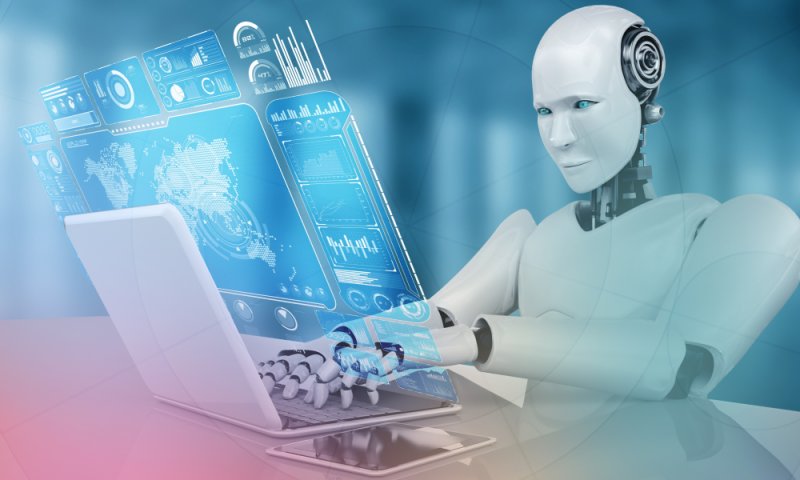
Harnessing the Power of ML App Development for Business Automation

In the contemporary business environment, automation, driven by machine learning and AI technologies, has transitioned from being a luxury to a necessity. As organizations seek to enhance efficiency and foster innovation, machine learning (ML) application development, including mobile app development and AI & ML services, has become an essential instrument for improving business processes. This article examines the importance of business automation, highlighting the transformative advantages of ML technology, supervised learning, and reinforcement learning. From increasing productivity to enabling more informed decision-making, it explores how ML can revolutionize operations, driven by advanced search techniques and feature engineering, and the pivotal role of IndiaNIC, a premier web, mobile app, and custom software development company in the USA, in facilitating these advancements.
Key Takeaways:
Harness the power of ML app development to automate business processes, including transportation automation, and increase efficiency and productivity.
Experience personalized user experiences and improved decision making with the implementation of ML technology, leveraging predictive analysis and historical data.
Partner with IndiaNIC, the top web, mobile app, and custom software development company in the USA, for customized ML solutions, AI and ML development services, and a collaborative approach to business automation.
The Importance of Business Automation
Business automation is becoming increasingly vital in today’s fast-paced digital landscape, especially with the integration of advanced technologies such as Machine Learning (ML), Artificial Intelligence (AI), and AI-driven business transformation. Companies like IndiaNIC, a top web, mobile app, and custom software development company in the USA, are harnessing these technologies, including AI operations, to streamline operations, enhance customer satisfaction, and mitigate risks associated with cybersecurity threats.
As businesses across various sectors, including eCommerce, healthcare, finance, transportation, and manufacturing, seek to optimize their processes, they are discovering that automation not only improves efficiency but also drives innovation.
What is ML App Development?
ML app development refers to the process of creating applications that utilize machine learning algorithms to analyze data and make data-driven predictions, significantly enhancing the user experience. By integrating AI technologies, developers can harness user behavior and historical data, including data preparation and data pipeline management, to create mobile applications that adapt and evolve in real-time, leading to more personalized interactions.
This approach not only elevates user engagement but also drives the creation of adaptive solutions that meet the dynamic needs of individuals. Predictive analysis plays a vital role in this process, enabling applications to foresee user requirements, preferences, and security authentication needs based on past interactions.
Effective
- data management
- data quality enhancement
- algorithm optimization
- feature engineering
- training parameters
is essential for training machine learning models, ensuring that they are robust and accurate. By analyzing user behavior in depth, developers can refine app functionality, resulting in improved performance and higher customer satisfaction.
Ultimately, understanding these various aspects reflects a commitment to delivering tailored experiences in the digital landscape.
Why is ML App Development Beneficial for Business Automation?
ML app development offers a multitude of benefits for business automation, making it an essential tool for organizations looking to innovate and streamline their operations.
Through increased efficiency and productivity, improved decision-making capabilities, significant cost savings, and a personalized user experience, businesses can leverage machine learning and intelligent actions to transform their processes and achieve their business objectives effectively.
Increased Efficiency and Productivity
Increased efficiency and productivity are among the most significant advantages of ML app development, as these applications automate repetitive tasks and enhance workflow processes, including manufacturing processes. By utilizing data collection techniques, algorithm training, and machine learning algorithms, businesses can streamline operations, reduce human error, and free up resources for more strategic initiatives.
Through the implementation of machine learning solutions, including AI & ML technologies, organizations can transform their operational landscapes, enabling a more agile approach to decision-making. Automation plays a pivotal role in this development, as it not only accelerates processes but also enhances accuracy.
For instance, companies like Netflix utilize ML algorithms to analyze viewer preferences, which allows for personalized recommendations that significantly improve user engagement. Similarly, Amazon employs these technologies in inventory management, predicting stock needs and automating restock processes to avoid delays. These examples illustrate how leveraging machine learning, including real-world examples like Netflix and Amazon, can lead to a more productive and efficient work environment.
- Streamlined data analysis and reporting.
- Optimized supply chain logistics.
- Enhanced customer service through chatbots and virtual assistants.
Improved Decision Making
Improved decision-making is another crucial benefit of ML app development, as it provides businesses with data-driven insights through predictive analysis and machine learning algorithms. By harnessing vast amounts of data, organizations can identify trends, evaluate risks, and make informed choices that align with their business objectives. This advancement not only streamlines operations but also enhances overall performance.
Incorporating ML applications into business processes, such as healthcare applications, leads to a transformative impact on decision-making. For instance, through predictive analytics, companies can forecast outcomes and trends, allowing for proactive strategies in the financial industry.
- Retail: Businesses can analyze purchasing patterns to optimize inventory management, ensuring that popular items are always in stock.
- Finance: Financial institutions utilize machine learning models to assess credit risk, significantly reducing loan defaults.
- Healthcare: Hospitals leverage ML to predict patient admission rates, allocating resources effectively.
These data-driven insights enable organizations across sectors to make strategic decisions that not only align with current market conditions but also anticipate future challenges, setting them apart from competitors.
Cost Savings
Cost savings are a compelling reason for businesses to adopt ML app development, as automated processes reduce the need for extensive human resources and labor costs, significantly impacting the machine learning market. By optimizing resource allocation and minimizing errors, organizations can significantly cut operational expenses while maximizing output.
When organizations implement ML-driven solutions, they often experience substantial financial efficiency. For instance, automation of routine tasks can free up skilled labor to focus on more critical areas of business, such as strategy building or customer engagement. This reallocation not only enhances productivity but also leads to improved morale among staff, as they engage in more meaningful work.
- In fact, companies that leverage ML technologies report up to 30% savings in labor costs annually.
- Streamlining inventory management processes can reduce excess stock by 25%, further boosting savings.
Ultimately, these efficiencies allow firms to reinvest savings into innovation and growth initiatives, creating a positive feedback loop that enhances overall competitiveness.
Personalized User Experience
A personalized user experience is essential for achieving high levels of customer satisfaction, and ML app development plays a pivotal role in this regard. By utilizing machine learning algorithms, businesses can tailor their offerings based on user preferences and behaviors, creating dynamic and engaging interactions.
This form of customization not only enhances usability but also fosters a deeper connection between the user and the application. Techniques such as recommendation systems, which analyze past interactions, significantly aid in understanding individual user preferences.
Employing predictive analytics and personalization advantages allows the app to anticipate needs, making suggestions that feel both relevant and timely.
- User Segmentation: Categorizing users based on behavior helps in creating targeted strategies.
- Real-Time Feedback: Instant responses to user actions can continuously refine the user experience.
- Behavioral Tracking: Monitoring user activity to adjust and improve service offerings.
The result is a noticeable boost in customer satisfaction and retention, as users feel valued and understood, ultimately leading to increased loyalty, app performance, and more profound trust in the brand.
How Can ML App Development Be Implemented in Business Automation?
Implementing ML app development in business automation involves a strategic approach that incorporates various methodologies such as data collection, predictive analytics, and the integration of chatbots and virtual assistants during the integration stage. These tools enable businesses to streamline their processes and enhance user interactions in real-time.
Data Collection and Analysis
Data collection and analysis are foundational elements of ML app development, as they provide the raw materials needed for machine learning algorithms to generate meaningful insights and drive data-driven predictions using supervised learning and unsupervised learning. Effectively gathering and analyzing data, including data preparation and accuracy metrics, allows businesses to refine their strategies and improve their operations.
For organizations aiming to harness the power of Machine Learning and AI services, implementing a robust data collection strategy becomes imperative. This involves identifying relevant sources such as customer interactions, transactional data, and market trends to enhance their AI ecosystem.
- Surveys and Feedback: Direct feedback from customers is invaluable for understanding user preferences and improving products.
- Web Scraping: Automated tools can gather data from various online platforms, offering insights into competitor activities.
- APIs: Utilizing open APIs allows businesses to access external datasets that complement their internal data.
Once the data is collected, the analysis phase kicks in, which can employ methods such as statistical analysis, machine learning models, model training, and data visualization techniques to ensure model accuracy.
By systematically analyzing this data, organizations can make informed decisions, anticipate market trends, and enhance overall operational efficiency.
AI & Machine Learning Overview: Predictive Analytics
Predictive analytics is a key feature of ML app development that enables organizations to make informed decisions by forecasting future trends based on historical data.
By harnessing sophisticated machine learning algorithms, businesses can systematically analyze patterns within vast datasets, enabling them to anticipate market shifts and consumer behavior with remarkable precision. This capability not only aids in optimizing inventory and resource allocation but also enhances customer engagement through personalized experiences and effective marketing strategies.
- Trend Analysis: Methodologies such as regression analysis and time-series forecasting play a crucial role in identifying significant trends.
- Strategic Planning: The insights gained from predictive analytics inform decision-makers, allowing for proactive adjustments to business strategies.
- Competitive Edge: Ultimately, the use of predictive analytics positions organizations at the forefront of their industries.
With these advanced insights, businesses are better equipped to navigate uncertainty and capitalize on emerging opportunities.
AI Agents: Chatbots and Virtual Assistants
Chatbots and virtual assistants represent a significant advancement in user support and customer engagement, driven by ML app development technologies and AI-Driven Business Transformation. These tools enable businesses to provide instant responses and personalized interactions, improving user satisfaction and operational efficiency.
In recent years, companies have increasingly turned to these technologies for both customer engagement and streamlined operations. For instance, chatbots can handle frequently asked questions, thus freeing up human agents for more complex inquiries. This not only enhances customer experience but also allows businesses to optimize their workforce through custom AI Services.
- Personalization: By analyzing user data, chatbots deliver tailored suggestions, increasing sales opportunities and eCommerce solutions.
- 24/7 Availability: Unlike traditional support, virtual assistants don’t require time off, allowing companies to engage clients around the clock.
Successful implementations, such as those seen in retail and financial services, highlight improved customer loyalty and operational productivity, making them invaluable in today’s competitive market.
The Role of IndiaNIC in ML App Development for AI Business Automation
IndiaNIC plays a pivotal role in ML app development for AI Business Automation, leveraging its expertise in AI technologies and custom software development to help organizations achieve their goals, driving AI Operations.
As a top web, mobile app, and custom software development company in the USA, IndiaNIC collaborates closely with clients to design tailored solutions that meet their specific needs in an evolving digital landscape.
Expertise in Web, Mobile App, and Custom AI Services
IndiaNIC’s expertise in web development, mobile app development, and custom AI Services positions it as a leader in the ML and AI services space, providing businesses with innovative solutions tailored to their unique challenges. Their skilled team utilizes the latest technologies, including Computer Vision Solutions and NLP Solutions, to create applications that enhance operational efficiency.
Beyond Machine Learning Development, their capabilities extend to:
- cloud computing
- Artificial Intelligence
- IoT (Internet of Things)
- AR/VR (Augmented Reality/Virtual Reality)
- Generative AI Solutions
This diverse skill set enables the team to tackle a wide range of client needs effectively. For instance, one notable success story involves a retail client who saw a 30% increase in sales after implementing a mobile app developed by IndiaNIC that utilized predictive analytics.
Such case studies underscore the company’s commitment to delivering results-driven solutions through agile methodologies, ensuring that each project aligns with the client’s strategic objectives and industry benefits.
Utilizing Cutting-Edge AI Tech Stack
Utilizing a cutting-edge AI Tech Stack is a hallmark of IndiaNIC’s approach to ML app development, as their team consistently integrates the latest AI and machine learning algorithms to enhance app performance and data quality. This commitment to innovation ensures that their solutions remain competitive in a rapidly evolving market.
By leveraging advanced techniques such as deep learning, natural language processing, and predictive analytics, the team ensures that applications not only function efficiently but also provide a seamless experience for users. These technologies enable developers to tailor functionalities to real user needs, emphasizing personalization and intuitive interactions, optimizing AI-Driven Business Transformation.
- Deep Learning: Enhances image and speech recognition.
- Natural Language Processing: Improves user engagement through conversational interfaces.
- Predictive Analytics: Boosts decision-making capabilities for businesses.
The integration of these technologies facilitates adaptive learning, allowing applications to evolve based on user behavior and feedback. This iterative approach not only uplifts user satisfaction but also positions clients strategically within their respective industries.
Customized Solutions for Business Needs
IndiaNIC is dedicated to providing customized solutions that align with the specific needs of each business, ensuring that their ML app development services are tailored to meet unique requirements. Through close collaboration with clients, IndiaNIC designs software that addresses real-world challenges and maximizes operational efficiency, driving AI and ML technologies in various industries.
By employing a thorough understanding of industry dynamics and technological advancements, the team at IndiaNIC engages clients at every step of the process.
- Identifying unique business objectives
- Conducting in-depth analyses of target audiences
- Incorporating feedback throughout the development cycle
This meticulous approach not only fosters trust but also leads to the creation of solutions that are innovative and scalable. Ultimately, by customizing machine learning applications, IndiaNIC enables its clients to harness data-driven insights, driving growth and enhancing decision-making capabilities within their organizations, offering comprehensive AI & Machine Learning Overview.
Collaborative Approach with Clients
IndiaNIC employs a collaborative approach with clients to ensure successful outcomes in their ML app development projects, emphasizing constant engagement and feedback throughout the process. This method fosters strong partnerships and results in solutions that truly align with client objectives, utilizing AI & ML Services.
By actively involving stakeholders from the initial stages, IndiaNIC not only enhances transparency but also accelerates the decision-making process. This continuous dialogue allows for adjustments based on real-time insights, ensuring that the project remains aligned with evolving business needs.
- Regular updates: Scheduled meetings keep all parties informed.
- Feedback loops: Encourages clients to share their thoughts and concerns promptly.
- Iterative development: Allows for incremental improvements based on client input.
Ultimately, such a dedicated focus on collaboration leads to more innovative solutions that meet the strategic goals of clients while reinforcing their trust in the development process.
Schedule a Free AI/ML Consultation
Frequently Asked Questions about AI & Machine Learning Overview
What is ML app development and how can it benefit AI Business Automation?
ML app development refers to the use of machine learning algorithms to create intelligent and automated apps. This technology, part of the AI ecosystem, can greatly benefit your business by streamlining processes, improving efficiency, and increasing accuracy through AI Operations.
How does harnessing the power of ML app development set my business apart from competitors?
By utilizing ML app development, you can stay ahead of the curve and offer your customers advanced and efficient solutions related to AI and ML Services. This sets you apart from competitors who may still be using traditional methods of eCommerce and business automation.
Can ML app development and custom AI Services help my business save time and resources?
Absolutely. ML app development, along with NLP Solutions and Computer Vision Solutions, can automate tasks and processes that would normally require manual labor, thus saving your business time and resources. This can lead to increased productivity and cost savings.
How can IndiaNIC, as the top app development company in USA, assist in harnessing the power of ML and AI-Driven Business Transformation for my business?
IndiaNIC has a team of experienced developers who are well-versed in ML app development and AI Tech Stack. They can work with you to understand your business needs and create tailored solutions to automate your processes and improve efficiency with Generative AI Solutions.
Is ML app development and AI Agents only for large corporations, or can small businesses benefit as well?
ML app development and Data Science & Analytics can benefit businesses of all sizes. In fact, small businesses can see even greater benefits as they may not have the resources for extensive manual labor. With ML app development, they can automate tasks and compete with larger corporations by utilizing AI Operations.
What are some examples of areas in my business that can be automated using ML app development and AI ML Services?
ML app development can be applied to a variety of business processes, such as data analysis, customer service, inventory management, and eCommerce solutions. By automating these tasks with Machine Learning Development, your business can operate more efficiently and effectively, much like successful implementations in apps such as Migraine Buddy and Optimize Fitness, as noted by Grand View Research.
By,
Mihir Rawal
Ph.D. Scholar, AI and ML
By,
Mihir Rawal

